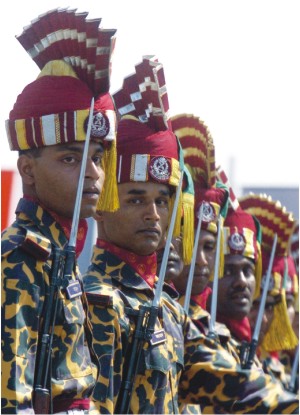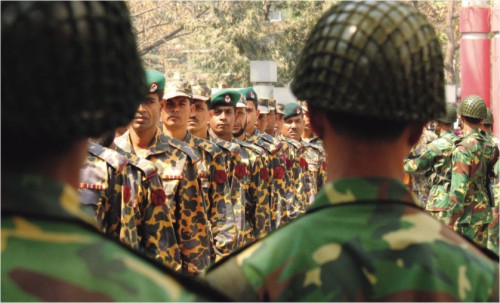
Inside
|
Brothers in Arms Shamsuddin Ahmed recounts the BDR's storied history and questions the narrative of mutiny While we celebrate February 21 as a glorious day in our national calendar in commemoration of the supreme sacrifice by our students who laid down their lives on this day in 1952 for the cause of our mother tongue being given the status of state language of the then Pakistan, a great tragedy befell our nation in the very same month this year, to be precise on February 25 as troops of Bangladesh Rifles, a paramilitary force staged a bloody mutiny, mercilessly killed 57 unarmed army officers, looted and vandalised officers family quarters, dumped dead bodies in the sewer and in mass graves, and fled away in civilian clothes like hordes of bandits. Henceforth February 25 will remind the nation every year of a dark day when troops of BDR
denigrated themselves as soldiers and besmirched the name of this paramilitary force by resorting to bestiality and barbarism on a scale which will put to shame any force no matter by what name you call it. BDR which is entrusted primarily with the responsibility of border protection and anti-smuggling duties of the country boasts an illustrious past spanning over two centuries. The force changed its name, its weaponry, its uniform, and its organisational structures a number of times as it was called upon to perform divergent functions over the years. But one thing did not change. The force acquitted itself well no matter what role it was assigned to perform. It started its journey in 1795 as Ramgarh Local Battalion. It was tasked to suppress the insurgents in Ramgarh area which it accomplished with great success. It established the first camp in the uniquely lush green abode of Pilkhana in 1799. The force was later reorganised and renamed as Frontier Guards in 1861 and remained so till 1890. The force was further reorganised and named Bengal Military Police in 1891. Commanded by a subedar (senior warrant officer) the battalion had four companies located at Dhaka, Dhumka, and Gangtok. The force was further reorganised and its strength increased under the name of Eastern Frontier Rifles in 1920. After partition of India in 1947 the force was reorganised and renamed as East Pakistan Rifles (EPR). A metropolitan armed police of Calcutta and some 1,000 ex-soldiers of West Pakistan origin of Pakistan army were merged into the force. Officers from Pakistan army, overwhelmingly non-Bengali officers, were posted on secondment to this force. The strength of EPR troops stood at about 13,500 in March 1971. The Bengali troops of EPR were the first to take up arms against the Pakistan occupation army right after midnight of March 25 when the Pakistan army treacherously attacked the unarmed Bengalis across the country under Operation Search Light. They fought valiantly in different sectors under the command of Bengali army officers for the liberation of the country in 1971. Their bravery and patriotism in the War of Liberation was amply vindicated when they boasted as many as 142 gallantry awards including 2 posthumous highest gallantry awards of Bir Sreshtho, 40 Bir Bikrams, and 91 Bir Pratiks. The BDR troops had genuine grievances during their long service in erstwhile EPR where they were very badly treated not only by the non-Bengali junior commissioned officers (JCOs) and non-commissioned officers (NCOs), but also by the predominantly non-Bengali officers. The sepoys who formed the bulk of the troops were 100% Bengalis, but JCOs and NCOs who provided leadership at company, platoon, and section level were a mixed bag. In a paramilitary force in which Bengali foot soldiers formed the mass, there ought to have been opportunities for them to rise up the career ladder to become NCOs and JCOs. But this was not be because there were a good number of non-Bengali NCOs and JCOs who would block their promotion opportunities. As a result there were fewer Bengali NCOs and JCOs than what should have been as a matter of rightful representation.
I commanded an EPR wing whose senior JCO was one Subedar Major Buta Khan who hailed from Jhelum. He had served in the Pakistan army before. The pay structure of EPR Jawans was abominably poor. So were the rations and the living condition system of EPR troops. I found a deep-seated resentment of troops towards non-Bengali army officers, JCOs, and NCOs who generally identified themselves as the ruling class, treating the Bengalis as the ruled, the inferior, and the non-martial. Besides, most of these officers who came to serve in EPR for two to three years were busy making extra money through corruption before they would go back to West Pakistan much richer with a big bank balance and other luxury items such as cars, TVs, refrigerators, etc. They had hardly any time to look into some of the genuine grievances of troops and do something by way of welfare activities and boosting their morale. Of course, there were a few honourable exceptions. Nevertheless, it is no wonder that the EPR troops from the sepoy to the senior-most JCO rose instantly in revolt against their non-Bengali officers in EPR and against the Pakistan army much before I as an army officer could do so. There is no denying that the situation vastly improved in favour of the troops when after independence the force was reorganised as BDR. As a senior staff officer at the BDR headquarters in 1975-76, I was a party to the process initiated to reorganise the BDR in the light of its role as a premier paramilitary force in a sovereign and independent Bangladesh. While our land border remained the same 4,427 km stretch, total manpower of the force shot up from an odd 13,500 of EPR strength many times higher to the present strength of 67,000. Not only have we gone about reorganising the BDR headquarters, the sector headquarters, and the battalions. We have also raised additional sectors, additional battalions (formerly known as wings), and opened up additional border outposts (BOPs) primarily with the aim of creating more job opportunities and opening up vast opportunities for promotion in the rank and file of BDR.. It was in 1975 that we created the posts of deputy assistant director (DAD) as an incentive for senior JCOs to become officers of their own force. It was one of their long felt demand which was fulfilled. This is certainly no mean achievement. Pay package of BDR troops has vastly improved over the years as compared to what it used to be in the erstwhile EPR. Given the fund constraints of the government, living conditions in BOPs and in the battalion headquarters and sector headquarters and at Pilkhana are far better today than they were in erstwhile EPR. Efforts have been made to address the genuine grievances of the troops ever since the force began its journey under the new name of BDR. Let me catalogue briefly some of the welfare measures initiated by the BDR leadership for BDR members and their families: Financial assistance. In 2008, BDR donated Tk. 310,000 for the marriage of daughters of BDR members. Another Tk. 297,800 was donated to dependents of deceased BDR soldiers and retired BDR personnel. Education Stipend from Prime Minister's Welfare Fund. In 2007, Tk. 190,000 was given as stipend for meritorious children of BDR personnel. DG BDR's Special Stipend Welfare Fund. In 2007, Tk. 665,000 was given to deserving children of BDR personnel as education stipend. Special Monetary Help for Martyrs in Boroibari Border Clash. In 2003, three dependents of three martyrs of Boroibari incident were given Tk. 300,000 each. Another Tk. 130,000 was paid to others who joined the border clash. Funds for Performing Hajj. In 2007, Tk. 3,564,000 was provided to 18 members of BDR to perform Hajj. There has been considerable progress in man management and welfare activities in BDR over the years. Given that army officers who command BDR for a limited period of two to three years and then revert back to the army can hardly command obedience and loyalty from the BDR troops, the situation is far better now than it used to be in the bad old days in EPR. Today the officers speak the same language and come mostly from the same social background as the troops do and also share much in common in terms of religion and culture -- which opens up enormous opportunities to understand each other. There is no natural barrier between army officers and their under-command troops in BDR. If there is any, it is artificial and man-made. I am not prepared to believe that there were grievances which fuelled anger among BDR troops to the extent that they were forced to rise in mutiny and go on a spree of senseless killing and bestiality as happened on February 25. This was clearly the result of something which had gone terribly wrong somewhere. Maybe there were undesirable politically motivated elements inducted in the force who have been lying in wait to strike a blow like this. It does not make sense to me that members of a force who have been widely accused of corruption and involvement in smuggling in the border belt were seething with discontent for alleged corruption surrounding the dal bhat program. The so-called grievances which BDR mutineers spoke about before the private TV channels on the day of the mutiny were hyped up by vested interests who might have enacted the bloody mutiny from behind the scenes. While the mutineers and their masterminds must be found out and dealt with ruthlessly as they ought to be, the government must not be complacent to feel that the crisis is over. The mutiny was directed at weakening the army which remains the single national force capable of bringing about peace and order out of a chaos and at forcing this government out of power before the government consolidates its power and takes up the unfinished job of punishing the killers in the Bangabandhu Murder Case and putting on trial the collaborators accused of war crimes and crimes against humanity.
The enemy may very well strike at the army itself. In the past the anti-liberation forces had played up the anti-India card effectively to stir up dissentions and mutinies in the army. Meanwhile what should we do with BDR? Shall we continue with army officers commanding the force as before? We need to take some hard decisions now in the larger interest of the country. Let there be a thorough screening of all BDR personnel serving in various sectors and training establishment outside Dhaka and weed out those who were sympathetic towards and even remotely connected with the mutiny and the mutineers. The force must change its present name once again because it is now most ignominiously associated with the February 25 mutiny and carnage. Let us also decide as a long-term policy to gradually phase out army officers serving on deputation in the force over a period of ten years from now. Meanwhile, retired army officers of the rank of captain and major and even lieutenant colonel with a clean record of good discipline may be absorbed permanently in the force. Hopefully this may help assuage anti-army officer feelings, if any, among the rank and file of the force, and bring about a much needed camaraderie between the officers and the troops of this force. Brig Gen Shamsuddin Ahmed (retd) is a former BDR Sector Commander and former Military Secretary to the President. |


